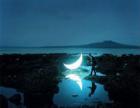初中英语语法总结
He does his homework more and more carefully.
他做作业越来越认真了。
⑦“the+比较级,the+比较级”表示“越……,越……”。
The more careful you are,the fewer mistakes you’ll make.你越认真,犯的错误越少。
⑧“特殊疑问词+be+形容词比较级,甲or乙?”
Which is bigger,the earth or the moon?
哪一个大,地球还是月球?
⑨“特殊疑问词+实意动词+副词比较级,甲or乙?”
Who draws better,Jenny or Danny?
谁画得比较好,詹妮还是丹尼?
2. 修饰比较级的常用单词
much,a lot,far,a little,a bit,,even,still,any
Lesson One is far easier than Lesson Two.
第一课远比第二课容易。
Tom looks even younger than before.
汤姆看上去比以前更年轻了。
He studies even harder.
他学习更努力了。
This train runs much faster than that one.
这辆火车比那辆跑的快。
She drives still more carefully than her husband.
她开车比她丈夫更认真。
You must come a little earlier tomorrow.
你明天必须早点来。
This story is much more interesting than that one.
这个故事比那个有趣的多。
大家要牢记以上形容词和副词比较级9个句型和常用的修饰词,它们是是平时考试和中考中的高频考点。
形容词和副词最高级的用法(句型)
1.“主语+be+the+形容词最高级(+单数名词)+in/of...”表示“……是……中最……的”。
Tom is the tallest in his class./of all the students.
汤姆是他们班上/所有学生当中最高的。
This apple is the biggest of the five.
这个苹果是五个当中最大的。
2.“主语+实意动词+(the)+副词最高级+in/of...”表示“……是……中最……的”。
I jump (the) farthest in my class.
我是我们班跳得最远的。
3.“主语+be+one of the+形容词最高级+复数名词+in/of...”表示“……是……中最……之一”。
Beijing is one of the largest cities in China.
北京是中国最大城市之一。
4.“特殊疑问词+be+the+最高级,甲,乙,or丙?”用于三者或三者以上的比较。
Which country is the largest,China,Brazil or Canada?
哪个国家最大,中国,巴西还是加拿大?
5.“特殊疑问词+助动词+主语(+the)+副词最高级+甲,乙,or丙?”用于三者或三者以上的比较。
Which season do you like (the) best,spring,summer or autumn?
你最喜欢哪一个季节,春天,夏天还是秋天?
注意:副词最高级用在句中时,其前可以加the,也可以不加;但形容词最高级用在句中时,其前一般都要加the。
四.情态动词重难点
情态动词有具体的词义,但也同助动词一样,需要与动词原形一起构成句子的谓语,另外情态动词没有人称和数的变化,情态动词后必须跟动词原形。
(一) 10个最重要情态动词的用法
1. can
⑴ 表示能力,一般译为“能、会”,尤其指生来具备的能力。
She can swim fast, but I can’t .
她会游泳,但我不会。
⑵ 表示许可,常在口语中。
You can use my dictionary.
你可以使用我的词典。
⑶ 表示推测,意为“可能”,常用于否定句和疑问句中,此时can’t译为“不可能”。
Can the news be true?
这个消息可能是真的吗?
It can’t be our teacher. He is on a visit to the Great Wall.
不可能是我们老师。他正在参观长城呢。
2. could
⑴ can的过去式,意为“能、会”,表示过去的能力。
He could write poems when he was 10.
他十岁的时候就会写诗。
⑵ could在疑问句中,表示委婉请求的语气,此时could没有过去式的意思。
Could you do me a favour?
你可以帮我一个忙吗?
—Could I use your pen? 我可以使用你的钢笔吗?
—Yes, you can.(注意回答)可以。

 实用的生活知识参考!
实用的生活知识参考!





